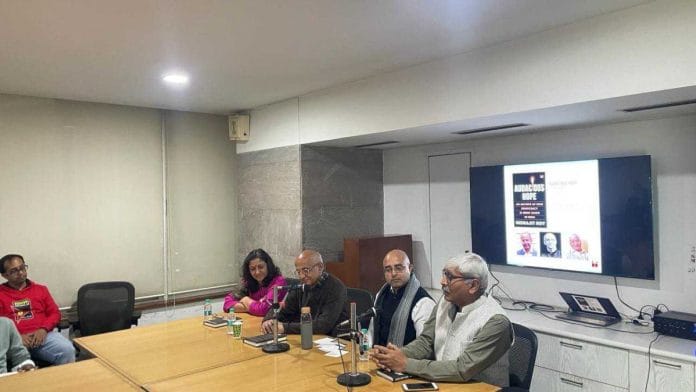When former IAS officer and activist Harsh Mander met Asif Iqbal Tanha after he was released on bail in 2021, he had one question. “After all this, do you feel hope or despair?” Tanha, a student activist who was at the forefront of protests against the Citizenship Amendment Act, had been arrested in 2020 and spent a year in jail.
“Despair is blasphemy,” Tanha had told Mander.
This poignant exchange set the stage for a panel discussion on author Indrajit Roy’s book, Audacious Hope: An Archive of How Democracy is Being Saved in India. Tanha, who is no longer in jail, was not part of this discussion. But hope – and his view of it – was central to the talk.
“Hope is not delusional. It is realistic and grounded in what is going on,” said Roy, professor of Global Development Politics at the University of York, England. And he’s put his faith in the “ordinary people of India” who challenge the government and society when necessary and embody the spirit of democracy.
His book chronicles “vital acts of hope” exhibited during events like the anti-CAA protests, the Covid-19 pandemic, and the farmers’ protests. Such acts preserve the collective spirit of resistance essential for the survival of any democracy.
Hope as a tool for change
Roy sees hope as a powerful tool that can motivate a person to fight against injustice. “[It] allows one to imagine an alternative world that is fairer… And from such audacious hope springs the ideas that allow people to confront, subvert and undermine democratic decline,” he writes in his book.
In one chapter he talks about Tamil poet Sukirtharani, the first in her village to graduate. “The gruesome rape and murder of Dalit women in Maharasthra’s Khairlanji district back in 2006 shocked her into reflecting on her own identity as a Dalit woman: poetry offered her a means of expressing her thoughts,” he writes. And she did this in her poem Yen Udal (My Body), which is about a Dalit woman’s refusal to be “confined by a caste-supremacist patriarchal society”.
Roy sees democracy as constantly evolving and not limiting itself to elections and institutional checks and balances. Fundamentally, it is about people making choices and asserting them. And that comes with hope.
“Democracy welcomes, rather than stifles, dissent,” he added.
Mander, reflecting on his own experiences, compared despair to opium, lulling individuals into a state of inaction. He harked back to his college days, remembering protests and marches driven by the conviction for a better society. That sense of belief is missing in the youth of today, he declared.
“It is this belief that we need to get back. Often, even I seem to be losing hope but we need to keep fighting for a better world,” he said.
Also read:
‘Hope doesn’t announce its arrival’
The conversation briefly moved to control over information dissemination when Karthika VK of Westland, the publisher of Audacious Hope, spoke about the importance of providing diverse perspectives and preserving the integrity of scholarship. But the panellists swiftly returned to a lively debate on distinguishing between hope based on solidarity and hope grounded in fear.
Then, Apoorvanand, a professor of Hindi at the University of Delhi, recalled how the Narendra Modi government came to power in 2014: with the slogan of “ummeedon ki raajneeti (the politics of hope)”.
“Hope is no more a shared feeling,” he stressed.
Mander, however, highlighted instances of hope emerging amid fractured sensibilities, such as Hindus quietly saving lives during the 2020 Northeast Delhi riots.
“When I worked in Gujarat post the 2002 riots, the anniversary programme to honour survivors of the event every year would see Hindus come up and discuss solidarity and equality. [But] in the case of the Northeast Delhi riots, Hindus are scared to come up and say they saved lives. They fear ostracisation by their own community,” he said.
At this point, Roy stepped in to warn panellists and audience members about conflating hope with utopia.
During this discussion, one gentleman raised the topic of hope beyond politics.
“As a man with a nine-to-five job, I am not concerned about politics but we live in a hope bubble,” he said.
This attendee happened to be Roy’s neighbour. He had boycotted a Residents Welfare Association (RWA) meeting on banning vendors from entering his society to attend the talk.
“Hope does not announce its arrival. Perhaps you don’t know, your act of coming here is the kind of hope we need,” Roy replied.
(Edited by Zoya Bhatti)






